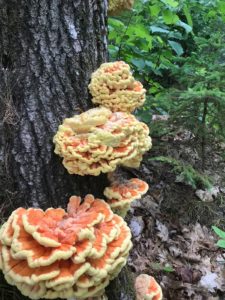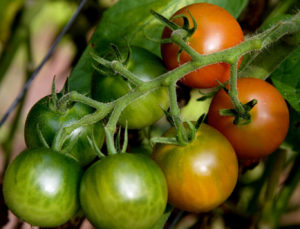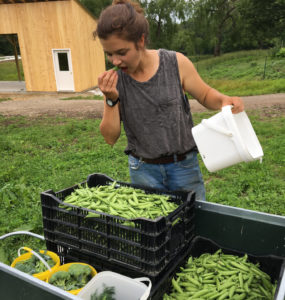“What! No sugar? Are you crazy?”
These are the words I was expecting to hear from my fellow Chewonki community members, but I’ve been pleasantly surprised by their excitement and encouragement for our week of no refined-sugar. I suppose I shouldn’t have expected anything other than curiosity and support for this endeavor, but after researching refined sugar and it’s effects on the human body, I was worried there might be a riot in the dining hall. For many people, especially in the United States, consuming sugar is a pleasurable act that releases dopamine in the brain. This release of dopamine positively reinforces the behavior of eating sweets, and thus a sugar addiction can begin. You can imagine what happens when you take sugar away from someone with an addiction – panic, anger, sadness…riots. Luckily, legitimate sugar addiction is not common, and most people who love sweets will be able to easily transition into this no-refined-sugar week. Hooray!
You may be wondering what “refined sugar” really means. When a beet, for example, is refined, it is stripped of all nutritional value; it goes through a series of steps including sugar extraction, pressing, carbonation, and boiling until the end result is pure sugar, and nothing else. All other commercialized sugar products go through a similar process. For this week, no refined sugar means: no sugar produced from beets, corn or sugar cane (which includes white sugar, brown sugar, molasses, corn syrup, cane syrup, and any type of “raw” sugar), no imitation maple syrup or maple syrup with any sugars added, no honey with any sugars added, and no agave syrup. Processed foods that contain any of the above sugars will be avoided as well. And although Chewonki is not prone to using artificial sweeteners or sugar alcohols, I’d just like to throw it out there that these ARE NOT suitable alternatives to refined sugar. Please put that bag of Splenda back on the shelf, and never look back.
end result is pure sugar, and nothing else. All other commercialized sugar products go through a similar process. For this week, no refined sugar means: no sugar produced from beets, corn or sugar cane (which includes white sugar, brown sugar, molasses, corn syrup, cane syrup, and any type of “raw” sugar), no imitation maple syrup or maple syrup with any sugars added, no honey with any sugars added, and no agave syrup. Processed foods that contain any of the above sugars will be avoided as well. And although Chewonki is not prone to using artificial sweeteners or sugar alcohols, I’d just like to throw it out there that these ARE NOT suitable alternatives to refined sugar. Please put that bag of Splenda back on the shelf, and never look back.
Sugars that can, and will, be consumed during our refined-sugar-free week are fruits (fresh, dry, and juiced), local and homemade maple syrup, and local honey. Other sweeteners that could be used during this week are stevia extracts (but only if the ingredients specify “whole leaf stevia” and contain no added sweeteners), and plant syrups (local and/or organic is preferable, with no added sweeteners).
 The reason that we’re doing this refined-sugar-free week is to bring awareness to the Chewonki community about the terrible consequences of refined sugar. It harms the environment and it harms our bodies. Refined sugar production has been linked to deforestation in the everglades and tropics, destruction of coral reefs, pollution of waterways and oceans, forced and child labor practices, and supporting GMO crops. If that’s not enough to repel you from ingesting this stuff, consider what it’s doing to your body: an over-consumption of sugar (more than your 25g daily allowance) can lead to tooth decay, diabetes, obesity, heart disease, liver disease, cancer, depression, acne, and premature aging. Many of these “lifestyle diseases” have become more fatal than communicable diseases – a human history first!
The reason that we’re doing this refined-sugar-free week is to bring awareness to the Chewonki community about the terrible consequences of refined sugar. It harms the environment and it harms our bodies. Refined sugar production has been linked to deforestation in the everglades and tropics, destruction of coral reefs, pollution of waterways and oceans, forced and child labor practices, and supporting GMO crops. If that’s not enough to repel you from ingesting this stuff, consider what it’s doing to your body: an over-consumption of sugar (more than your 25g daily allowance) can lead to tooth decay, diabetes, obesity, heart disease, liver disease, cancer, depression, acne, and premature aging. Many of these “lifestyle diseases” have become more fatal than communicable diseases – a human history first!
All in all, the refined-sugar-free week at Chewonki will not be difficult for the kitchen staff – we rarely use processed foods in our cooking so we won’t have to watch out for sneaky added sugar, and we’ve been experimenting with refined-sugar-free-sweetened desserts for a couple months now. We feel confident that our quality of meals will not be compromised due to a lack of refined sugar.
– Courtney Sonia, Chewonki Cook












